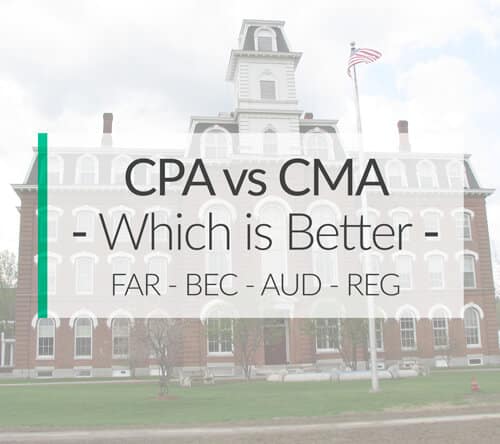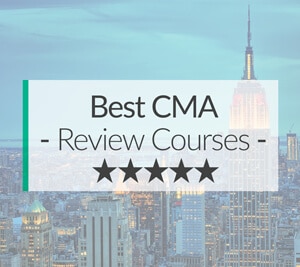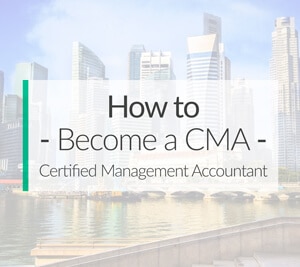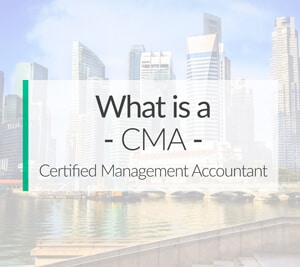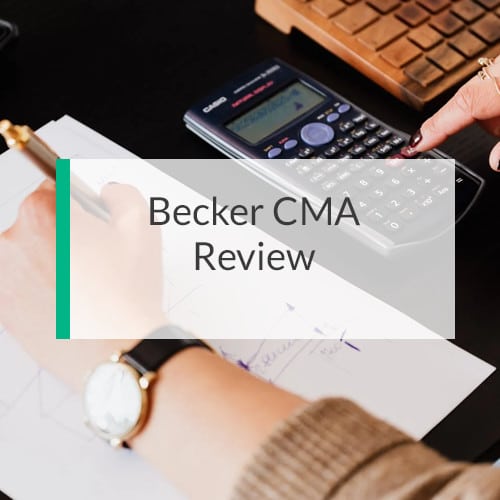Becoming an accountant is difficult, but the wide range of career choices can make it even more difficult for some. Becoming a CPA is the logical choice if you intend on starting your career in public accounting, but what about management accounting?
So if you’re interested in this highly lucrative career path — one with a median annual salary over $70,000 — you’ll have to choose between the Chartered Global Management Accountant (CGMA) and Certified Management Accountant (CMA) certifications. Both of these are great starting points to rewarding occupations, but there are several differences between the two that are worth learning more about.
In order to make the choice easier, I took a look at the 2 certifications and saw what their key differences are. In particular, their education requirements, job outlook, and salary differ the most.
So if you’re determined to become a finance professional within management accounting, keep reading to compare CGMA vs. CMA and find out which certification you should pursue!
CMA vs. CGMA Education Requirements
The requirements for becoming a CGMA are fairly low. You don’t need to meet an educational requirement, but you do need a minimum of 3 years of work experience in accounting. Additionally, you need to prove that you embody the traits outlined in the CGMA Competency Framework. Finally, you must become a member of the AICPA— after all, these steps are supported as a part of the AICPA leadership program.
Alternatively, you can earn this certification through CIMA qualifications. Completion of all CIMA certification tests automatically qualifies you for the CGMA designation and membership into CIMA.
On the other hand, CMA prerequisites ask much more of you. The CMA program allows candidates to sit for the exam before they graduate. They just need to complete a bachelor’s degree from an accredited college or university within 7 years of passing all of the exam parts. On top of that, you need 2 years of work experience in management accounting or financial management. Lastly, you must abide by the Institute of Management Accountants (IMA) Statement of Ethical Professional Practice. Doing all of that proves that you’re qualified enough to sit for both parts of the CMA exam.
CMA vs. CGMA Exam Costs
Becoming a CGMA requires you to pay a $325 exam fee and enter the Finance Leadership Program. Unfortunately, the leadership program is fairly expensive; it comes in an annual subscription that costs $2,495.
If you’re already a Certified Public Accountant, here’s the good news— you only need to pay $425 to skip the program and take the exam. But if for some reason you still want to complete the program as a CPA, it only costs $1,895.
Ultimately, the CMA exam is much cheaper than the CGMA. You’ll need to pay an initial $250 entrance fee, then pay $415 for each part of the exam. There’s no need to pay for any required courses or yearly membership dues. You can also take advantage of a student discount, which reduces costs to a $188 entrance fee and $311 per test part.
Exam Difficulty
The CGMA exam is unique compared to other designations; it’s a case study exam instead of a more traditional test. According to the exam handbook, applicants are asked to complete 3 to 6 tasks related to a hypothetical work case. This shows that you possess the skills and competency required to work as a CGMA. You’ll have 3 hours to complete the exam and your answers must be written in the format requested during the task. That means your results may be styled as emails, reports, memos, or more.
On the other hand, CMAs take a much more traditional approach to their exam.
The CMA exam is split into 2 parts that can be taken in any order. Both parts last 4 hours and consist of 100 multiple choice questions and 2 essays. You’ll have 30 minutes to complete each essay and 3 hours to finish the multiple choice section.
Part 1 asks you to display competency in Financial Planning, Performance, and Analytics. By contrast, Part 2 wants to test you on Strategic Financial Management. You must complete at least 50% of the multiple choice questions before being allowed to move on to the essay.
Since this test is based on a wider field of knowledge than CGMA’s case studies, it’s fair to say it’s the tougher test between the two management accounting designations. Fortunately, it’s easy to prepare for this exam with the help of a well-made CMA exam review course.
“The CGMA exam is unique compared to other designations; it’s a case study exam instead of a more traditional test.”
Careers
According to the Bureau of Labor Statistics, both CGMA and CMA designation holders can expect a similar level of growth in their respective industries. In fact, demand for management accounting is expected to grow 4% in the next 10 years, which matches the average for all professions. As a result, either certification can be considered a safe and stable long-term career choice.
Generally speaking, employment growth for these certifications is closely linked to the overall health of the economy. As the economy grows, more people will need help with financial records. By contrast, fewer people will make enough money to require an accountant in an economic downturn. That can make it more difficult to predict the future of this career path, but it’s logical to expect a bit more job security with a globally recognized designation like the CGMA. That way, you can more easily find employment in a country with a booming economy.
CMA vs. CGMA Salary
Although there’s not much difference in employment between these two designation holders, salaries are much more variable. According to ZipRecruiter, CGMAs make an average of $51,826 a year. On the high end of that spectrum are CGMAs in senior positions who make $122,000 per year— but you’ll need to dedicate most of your career towards reaching that point. Lower paying jobs may pay as low as $29,500.
ZipRecruiter’s page for CMAs reveals a very different story. The average salary for a CMA is $67,926 a year, and it’s very rare for jobs to pay less than $62,500. However, you can also see that the highest paying jobs max out at around $86,000 per year.
CMA vs. CGMA Certification
Based on the info, you can see that average pay for CMAs is higher than CGMA but far more difficult to obtain certification. In comparison, CGMAs have more job opportunities and lower requirements for entry, but registration costs are higher if you’re not already established as an accountant.
Ultimately, it’s up to you to decide which area is more important for your career, but you could also benefit from earning both certifications. This would offer the most job security, flexibility, and opportunities for advancement and salary increases.
Whatever you choose, we wish you luck and hope your career is long and rewarding!
CGMA FAQs
Q: Which is better, CMA or CIMA?
A: Neither qualification is objectively better than the other, but they do have some key differences. For example, CIMA is recognized in more countries but takes more time to complete. The CIMA exam also costs a lot more, but CIMA certificate holders also tend to make more. You’ll need to decide which one works better for you.
Q: Is CMA better than MBA?
A: This is highly subjective. MBAs have more freedom in what career they choose, but companies tend to only want MBAs from top business schools. On the other hand, it’s much faster to become a CMA and start your career, but you may have less of a choice in where you work.
Q: How long does it take to become a CGMA?
A: It takes a minimum of 3 years to complete the full CGMA program and pass the exam.




